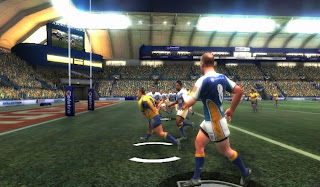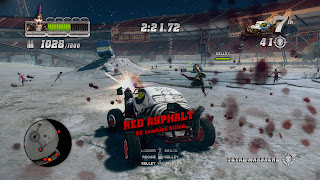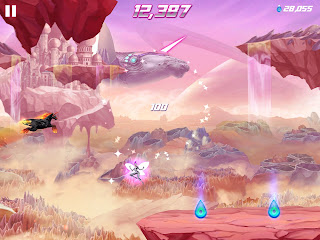Sidhe is the most veteran, most prominent, and arguably most important game developer that New Zealand has ever seen. It’s one of the very few developers from the country that regularly hits “highest revenue” ranking lists (for instance, the Develop 100), thanks to its stewardship over some very valuable franchises, such as the Rugby football games.
That sport might not be as big as soccer, but the various codes of Rugby are some of the biggest sports on a global basis and so there is a market for these games, and Sidhe has been able to capitalise on that popularity successfully on consoles.
And yet the studio is quietly transferring its energy to mobile and PC game development, under a new label, PikPok. New Zealand’s biggest and most experienced game developer is now, largely, a mobile developer. It’s CEO, Mario Waynands, also came under fire earlier in the year when he was accused of promoting “doom and gloom” over the console business – specifically the Nintendo Wii U.
Waynands doesn’t really believe it is this “doom and gloom” for the console industry, and while he does think that one of the “big three” will likely drop out by the end of the generation, the studio remains prepared to develop for consoles and it has developer kits. The main issue for Sidhe/ PikPok as an independent development studio is one that the fans of these consoles seem to refuse to accept, despite being a basic, undeniable fact of business; for the next gen, there is going to be nothing that justifies development for consoles over PC and mobile until enough people actually own the things to make healthy profit possible.
Or, as Waynands says: “Console retail overall is in trouble given characteristics such as the splintering of the platform market, high cost of production, heavy costs and logistical barriers to entry for developers, and retailer reliance on used games.
“Each [of the big three] can overcome the issues they face, but I question whether they can do it swiftly enough to create the critical mass install base they each need. I don’t expect all three of them to still be in the console business at the other side of this generation unless we see something game changing from each of them in this next critical year.”
The full interview is below:
Digitally Downloaded (DD): As the head of New Zealand’s largest game developer, how have you seen the local industry change and develop?
 |
| Into the Dead (mobile) |
Mario Wynands (MW): There has certainly been a lot of change since we started the company back in 1997. At the time, there were pockets of game development but there had actually been a decline since early success for a couple of NZ devs on the Amiga earlier that decade. It was relatively new territory and essentially the talent pool, technology and know-how had to be built from the ground up.
While new studios started up as we ticked over into the 2000s, few were able to get any traction with console development, and had to fall back on Flash, PC shareware, and mobile to hone their craft, get their games to market, and earn a living. Little did anyone suspect the market was going to shift heavily in favour of lightweight development and digital distribution just a few years later, so nobody realised NZ was laying the foundation for the years that followed.
Now we have dozens of developers operating professional, commercial operations and producing some of the best games in the world in their categories. New studios are constantly popping up, being supported with talent from tertiary training institutions offering formal game development courses and qualifications, and with investment being provided both locally and from overseas. It is a really exciting time for NZ as we see this industry mature and hit its stride.
DD: What specific challenges do large game development studios in New Zealand face, and where do you see the biggest opportunities?
MW: Well, I think the same problem we have for large studios here is the same problem studios face everywhere – keeping the lights on. A large studio means a large salary bill every month, so you need to keep the contracts coming in if you run on a work for hire model or you need your self-published titles to be an ongoing success if you have gone down that route. Cashflow is king.
As for opportunities, I think NZ is very well positioned to be a strong player on the global gaming scene, beyond what our size might suggest would allow. We have great creative talent here, and access to great tools and technology. When combined with a very outward looking culture that is attuned to US and British entertainment tastes but also has rich cultural influence from Asia and the Pacific, we have the opportunity to create world class games that resonate with a global audience. We’ve had some example success stories in movies, TV, music, fashion, and industrial design based on that same foundation, and I think the NZ games industry has the ability to eclipse those successes.
 |
| Rugby League 3 (consoles) |
DD: You also run a mobile-specialist brand, PikPok. What made you decide to keep the two brands separate?
MW: PikPok is actually our digital publishing label covering mobile, tablet, and desktop. We run all our publishing activity through that now. Whereas Sidhe is the “work for hire” console retail label.
PikPok was originally separated out as we made the move into mobile because in 2009 when the label was set up it wasn’t clear where smartphone as a platform was going. Although it was an accessible entry point for our digital publishing ambitions, the games at the time were pretty simple and fart apps still ruled the top spots of the App Store. “PikPok” was a new label because we weren’t sure what it was going to be, and we didn’t want to confuse our existing fanbase given we knew we would, at least initially, be targeting very different people. Under the hood though, both brands are just outward facing labels, and the staff, technology, and resources flow backwards and forwards between initiative for each readily.
PikPok is now the “primary” brand moving forward, so most new activity will happen under that banner.
DD: Is digital publishing going to be your primary focus moving forward? What are your plans for the next-gen consoles?
MW: The path towards being the masters of our destiny has been a long one, and digital publishing has given us that opportunity. We’ve had to keep our initial titles modest in their ambition to keep costs down, but as we continue to build on our successes, we are able to create deeper and richer experiences as we expand our catalogue. Developing and publishing for mobile, tablet, and desktop will definitely continue to be our focus.
We are staying open minded about console as we move into this next generation, and even already have next gen development kits. Even though I think there are some major challenges that the console manufacturers need to overcome, the ability to publish digitally to those consoles means there may be an opportunity there. We’d likely treat console as an incremental opportunity off the back of content we develop for desktop. I think we really need to see a meaningful install base before we would really take any new console seriously though.
DD: At the start of the year you ran into some controversy regarding some perceived criticism that you levelled at Nintendo. What do you think of the Wii U now, and what would you like to see from Nintendo to build its reputation with mid-sized developers like yourself?
 |
| Blood Drive (consoles) |
MW: Well, I’m not sure it was “controversy” so much as fanboys not wanting to accept my anecdotal evidence of other publishers talking about reducing their commitment to the Wii U on the back of a lukewarm launch. I went on to explain my own position on the challenges consoles faces in a couple of interviews which, perhaps more controversially, suggest that console retail overall is in trouble given characteristics such as the splintering of the platform market, high cost of production, heavy costs and logistical barriers to entry for developers, and retailer reliance on used games etc. In the months that have followed those comments, we’ve seen publishers withdraw a little from Wii U, and even becoming more outspoken about the future of console itself, such as Activision CEO Bobby Kotick with his own doubts commenting last week.
Nintendo, Microsoft, and Sony are all facing similar challenges and have some big choices to make about how they approach this next gen. Nintendo has taken a good first step by admitting there is a problem (or problems). Sony is actively trying to evolve in terms of streamlining their processes and opening up access to their platforms. Where Microsoft is at remains to be seen. Each of them can overcome the issues they face, but I question whether they can do it swiftly enough to create the critical mass install base they each need. I don’t expect all three of them to still be in the console business at the other side of this generation unless we see something game changing from each of them in this next critical year.
DD: You’re the premier developer of rugby games, but that’s a difficult sport for videogames, as it lacks the US and Japanese audiences that make sports like soccer successful. How do you manage to produce sports games for the fans when the audience (and thus budget) is limited?
MW: Rugby union games are indeed very hard games to make. You have dozen of entities running around, all keying off of each other in some semblance of strategy, with a fluid and evolving series of interactions, and the gamer provided a myriad of choices at any given time. There is a lot of complexity there to try and come out with something cohesive at the other end that actually resembles the real world sport at all. By comparison, soccer and American football have much less complex problems to solve.
But when FIFA and Madden set the bar for consumers, there is an expectation of quality that you need to match. And fair enough if you are asking gamers to pay the same for a copy of Rugby Challenge as a copy of FIFA. They don’t necessarily care (though many are sympathetic) about the fact that FIFA may have 10 to 20 times the budget of Rugby Challenge or that soccer is an inherently easier game to build a videogame around.
The key really is to pick your battles. Work out what is important, and focus on that from iteration to iteration. Try not to make mistakes or waste any dollar of the budget where possible. It can be tough, but the results can be there if you are disciplined.
With Rugby Challenge, we did have FIFA as our bar for quality, but we tried to limit the scope of the game and not overreach. The result was something that hit those highs, but didn’t consistently stay at that level throughout the game. With the sequel then, given the opportunity to iterate, our focus has been on lifting those lower quality portions of the game to achieve a more consistent, high quality experience.
Beyond that approach to production, we’ve tried to stay as connected as we can to the fan base, bringing their feedback and ideas into the process, giving them insight into our decisions and priorities, and managing expectations. I think we do a good job there relative to bigger players like EA.
 |
| Robot Unicorn Attack 2 (mobile) |
DD: You’ve also developed an in-house engine, Stencil. What opportunities do you see to license that tech to other developers?
MW: The studio has always leaned tech heavy, so we’ve made large investments in tools and tech over the years with an emphasis on reuse and reducing compliance issues. Stencil is one of the outcomes of that investment which has paid great dividends in terms of bringing a standard minimum set of features to our titles and making platform submissions much more clean and predictable.
However, it is one thing to have an engine and toolset that works well in-house, and quite another to support external teams using that same technology. We’ve been exploring licensing out the technology to third parties, but we need to tread carefully to ensure we could provide adequate support to licensees without hamstringing our own internal development. In the short to medium term, it is likely only third parties whose games we are publishing that will have access to our tech.
DD: Your game portfolio contains an interesting mix of licensed titles and original IP. How do you arrive at the balance between both sides of development, and why do you feel it’s important to do both?
MW: We certainly back ourselves to be creating great original IP, but exposing those games to the masses and building an audience does not necessarily follow just from quality alone. By tapping into different well known brands, licenses, and new and original third party developed content, we can build a much more well rounded portfolio of content that allows us to grow our fanbase much larger and much more quickly than relying on internally developed IP alone. It’s a long term strategic marketing motivated decision that has the side effect of allowing us to work with great external creatives and bring new ideas into the studio on an ongoing basis.
 |
| Melbourne Cup Challenge (console) |
DD: What are your long-term goals for Sidhe and PikPok?
MW: Sidhe is in the twilight of its life as a label as digital publishing becomes our focus, so PikPok is now carrying the torch.
Our ambition is to keep building our digital publishing business and to become a major player on that front. We’ve certainly already achieved a level of success with respect to that, but there is continued scope to release bigger, better, and more successful titles, and we are hungry for that. Our games have been downloaded by tens of millions of people already, but “hundreds of millions” would be a much more satisfying phrase to utter.
DD: Finally, what games are you playing at the moment?
MW: I’ve been travelling for work a lot over the past couple of years, so I don’t often have the time to sit down at home for hours in front of a console or computer. Nowadays, I’d be inclined to play a couple of songs on Dance Central at home rather than pick up a title from my past favourite genre, action adventure, only to have it still remain incomplete months later (or years in the case of Shadow of the Colossus and God of War 3). I am spending much more time gaming on my phone or playing indie games on my laptop, which I can do while waiting in queues, when stuck at the airport, or holed up in a foreign hotel room somewhere.
In terms of what has specifically been on my playlist lately, Candy Crush Saga, Clash of Clans, and The Walking Dead PC have all featured. I have Limbo, Bastion, and Torchlight 2 lined up, good to go. I’m behind, I know.







